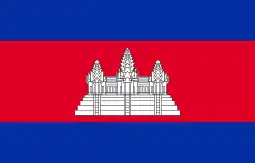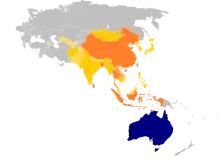ជនជាតិខ្មែរអូស្ត្រាលី | |
|---|---|
| Total population | |
| 33,149[1] | |
| Regions with significant populations | |
| New South Wales, Victoria | |
| Languages | |
| Khmer, Australian English, Cham, Teochew | |
| Religion | |
| Theravada Buddhism, Catholicism | |
| Related ethnic groups | |
| Khmers, Chinese Cambodians, Asian Australians |
Cambodian Australians are Australian citizens who were born, raised in, or from Cambodia usually having Khmer ancestry but also including Chinese Cambodians, Vietnamese Cambodians, Chams and other ethnicities of Cambodia. The term may also refer to Australians who have ancestors that were born, raised in, or from Cambodia & Vietnam.
History

Prior to 1970s most of the few Cambodians in Australia were children of upper income families or having government funded scholarships sent abroad to attend school. After the fall of Phnom Penh to the communist Khmer Rouge in 1975, a few Cambodians managed to escape, but not until the Khmer Rouge was overthrown in 1979 did large waves of Cambodians began immigrating to Australia as refugees.
In order to encourage rapid assimilation into Australian culture and to spread the economic impact, Australian government settled the 10,000 refugees in various towns and cities throughout the country.
However, once established enough to be able to communicate and travel, many Cambodians began migrating within Australia to certain localities where the climate was more like home, where they knew friends and relatives had been sent, or where there were rumored to be familiar jobs.
Consequently, large communities of Cambodians took root in major cities such as Sydney, Melbourne, Brisbane and Adelaide. The suburb of Springvale in Melbourne has a notably large Cambodian population.
Notable people
See also
References
External links
- Ashley Carruthers and Sarithya Tuy (2008). "Cambodians". Dictionary of Sydney. Retrieved 4 October 2015. (Cambodians in Sydney) [CC-By-SA]
- ↑ According to the local classification, South Caucasian peoples (Azerbaijanis, Armenians, Georgians) belong not to the European but to the "Central Asian" group, despite the fact that the territory of Transcaucasia has nothing to do with Central Asia and geographically belongs mostly to Western Asia.

